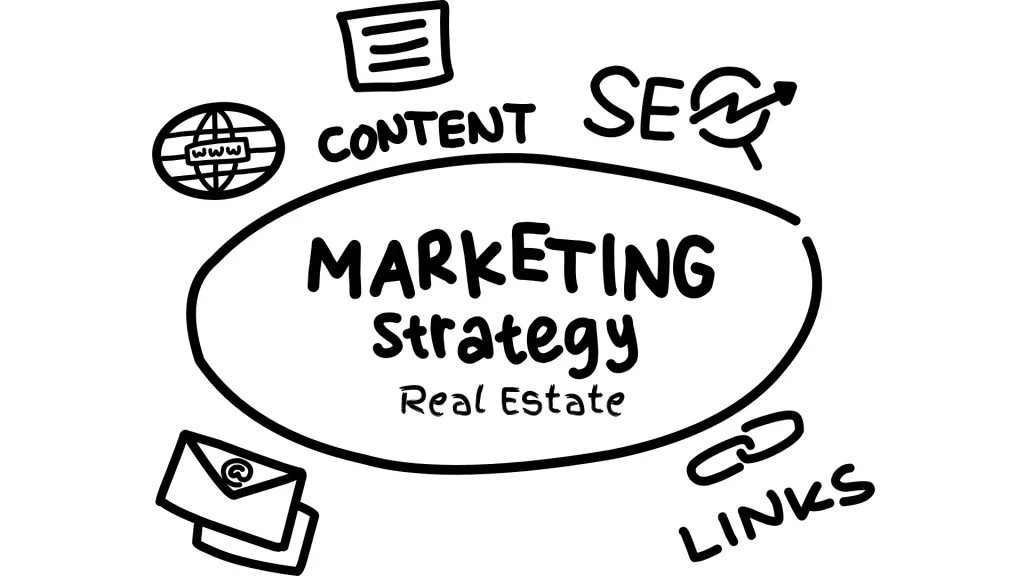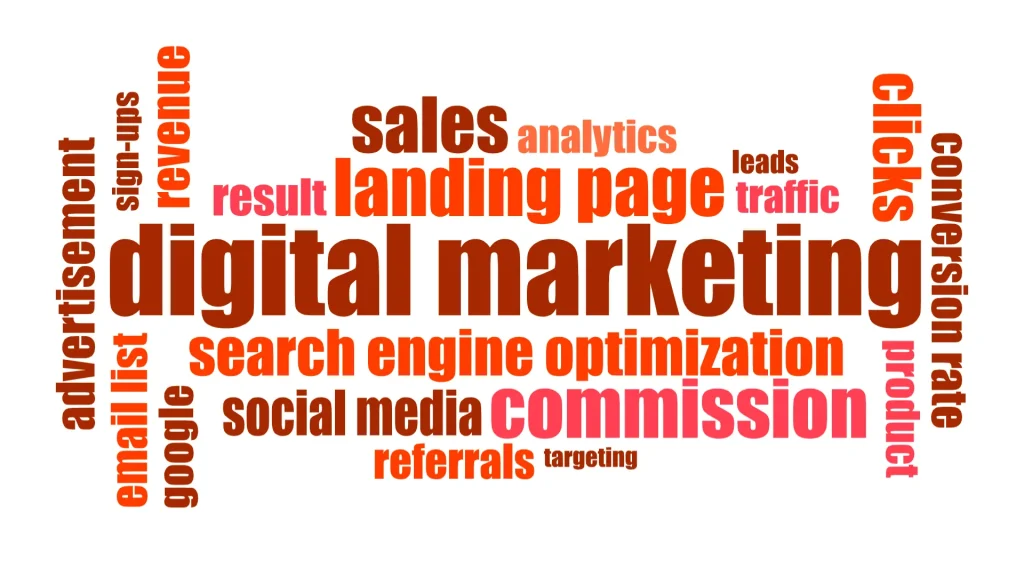Digital marketing for real estate refers to the use of online channels, platforms, and tools to promote properties, attract clients, and increase sales.
It includes various strategies such as social media marketing, SEO, content marketing, email campaigns, and online advertising to reach potential homebuyers and investors.
Why is Digital Marketing Essential for Real Estate Businesses?
In today’s digital age, homebuyers and sellers rely heavily on online platforms to search for properties, compare prices, and connect with real estate professionals.
Effective digital marketing enables real estate agents and agencies to establish an online presence, attract qualified leads, and stay competitive in the real estate market.
Real Estate Marketing in the Digital Age
Traditional marketing methods such as print advertisements and billboard promotions have been replaced by digital strategies. Online real estate marketing provides greater reach, engagement, and targeted advertising opportunities.
With the rise of virtual tours, social media platforms, and digital walkthroughs, buyers can now explore properties remotely, making the home-buying process more efficient.
Key Digital Marketing Strategies for Real Estate Success
SEO for Real Estate: Optimizing Your Online Presence
Search Engine Optimization (SEO) is a crucial strategy to enhance the visibility of real estate websites on search engines. By optimizing keywords like “real estate digital marketing,” “real estate online marketing strategy,” and “SEO for real estate,” businesses can improve their rankings, attract more visitors, and generate leads.
Content Marketing: Creating Value for Homebuyers and Investors
Creating high-quality content such as blog posts, guides, and property listings helps establish credibility in the real estate industry.
A well-researched guide to digital marketing and proven real estate marketing ideas can provide valuable insights to buyers and sellers, encouraging them to engage with real estate professionals.
Social Media Marketing: Engaging with Potential Buyers
Social media platforms like Facebook, Instagram, LinkedIn, and Twitter are excellent tools for real estate agents. Sharing virtual tours, market trends, and client testimonials can enhance engagement.
Using hashtags like “social media marketing” and “marketing for real estate agents” ensures broader reach and engagement.
Email Marketing Campaigns: Nurturing Leads Effectively
Email marketing remains a powerful tool for real estate marketing campaigns. By sending personalized email marketing campaigns, real estate professionals can nurture leads, provide property updates, and maintain relationships with potential clients.
Video Marketing: Leveraging Virtual Tours and Live Property Showcases
Video marketing has revolutionized real estate marketing. Creating virtual walkthroughs and live property showcases allows potential buyers to experience properties remotely.
This strategy enhances engagement and increases the likelihood of conversions.
Online Advertising: PPC, Display Ads, and Retargeting Strategies
Online advertising through Pay-Per-Click (PPC) campaigns and display ads can drive targeted traffic to real estate websites. Retargeting strategies ensure that potential buyers who have visited a website are reminded of available properties through strategically placed ads.
Real Estate Listings Optimization: How to Stand Out in Online Searches
Optimizing real estate listings with relevant keywords such as “real estate services,” “real estate professionals,” and “marketing for real estate companies” enhances visibility on online property portals. High-quality images, detailed descriptions, and customer testimonials can further improve engagement.
Influencer & Thought Leadership Marketing for Realtors
Real estate agents can leverage influencer marketing by collaborating with industry leaders, bloggers, and social media influencers to build credibility.
Establishing thought leadership through webinars, expert interviews, and guest blogging can position a realtor as a trusted expert in the field.
AI and Automation in Real Estate Marketing: Chatbots, CRM, and Data Analytics
Artificial Intelligence (AI) and automation have transformed real estate marketing. Chatbots enhance customer support, Customer Relationship Management (CRM) tools streamline lead generation, and data analytics provide valuable insights to optimize marketing campaigns effectively.
Building a Strong Online Presence for Real Estate

The Role of a Well-Designed Website in Real Estate Marketing
A professional and user-friendly website is essential for real estate professionals. It should feature property listings, search functionalities, contact forms, and client testimonials to attract and convert leads.
Mobile Optimization: Ensuring a Seamless User Experience
With a growing number of users searching for properties on mobile devices, ensuring mobile optimization is critical. A responsive website enhances the user experience and increases engagement.
Importance of Online Reviews and Reputation Management
Online reviews influence the decisions of potential buyers. Real estate businesses should encourage satisfied clients to leave positive reviews on Google, Yelp, and social media platforms to enhance credibility and trustworthiness.
Local SEO: Ranking Higher for “Near Me” Searches
Optimizing for local SEO ensures that real estate professionals appear in “near me” searches. Including location-based keywords like “real estate market trends in [city]” and “best real estate agent near me” improves search rankings.
The Power of Social Media Profiles: LinkedIn, Instagram, and Facebook
Maintaining active and engaging social media profiles helps real estate agents connect with potential buyers. Sharing informative content, success stories, and behind-the-scenes insights fosters strong relationships with clients.
Advanced Digital Marketing Tactics for Real Estate
Using Big Data & Analytics to Drive Real Estate Sales
Big data helps real estate professionals understand market trends, customer behavior, and pricing strategies. Data-driven insights enable better decision-making and marketing effectiveness.
Virtual Staging & Digital Walkthroughs for Property Showcasing
Virtual staging enhances property listings by allowing buyers to visualize furnished spaces. Digital walkthroughs provide an immersive experience, helping potential buyers explore properties remotely.
Real Estate Marketing Automation: Streamlining Lead Generation
Automation tools help real estate businesses manage leads, schedule follow-ups, and send automated emails, improving efficiency and customer interactions.
Leveraging AI & Chatbots to Improve Customer Interaction
AI-powered chatbots provide instant responses to inquiries, improving customer experience and engagement while freeing up time for real estate professionals.
Personal Branding & Thought Leadership for Real Estate Professionals
Establishing a strong personal brand through blogs, podcasts, and public speaking engagements enhances credibility and positions real estate professionals as thought leaders.
Measuring Success in Real Estate Digital Marketing

Key Performance Indicators (KPIs) to Track Marketing Efforts
Tracking KPIs such as website traffic, lead conversion rates, and engagement metrics helps real estate businesses measure the success of their digital marketing campaigns.
Google Analytics for Real Estate Websites
Google Analytics provides valuable insights into user behavior, traffic sources, and campaign performance, enabling marketers to make data-driven decisions.
Lead Conversion Metrics: Turning Clicks into Clients
Analyzing conversion rates helps identify areas for improvement in marketing strategies. A high conversion rate indicates effective lead nurturing and engagement.
How to Adjust Strategies Based on Performance Insights
Continuous analysis and optimization of marketing campaigns ensure better results. Real estate professionals should adapt strategies based on analytics and performance reports.
Also Read: Digital Marketing for Dummies: Everything You Need To Know
The Future of Digital Marketing in Real Estate
Emerging Trends in Real Estate Digital Marketing
New trends such as AI-driven property recommendations, voice search optimization, and virtual reality tours are shaping the future of digital real estate marketing.
The Role of Blockchain and NFTs in Property Transactions
Blockchain technology and NFTs (Non-Fungible Tokens) are revolutionizing property transactions by enhancing security, transparency, and efficiency.
Sustainable and Ethical Marketing Practices in Real Estate
Adopting sustainable marketing practices, such as eco-friendly property promotions and ethical advertising, aligns with the growing demand for green living.
Predictions for the Next Decade in Digital Real Estate Marketing
The next decade will see increased reliance on AI, automation, and immersive experiences, making digital marketing an indispensable tool for real estate professionals.
